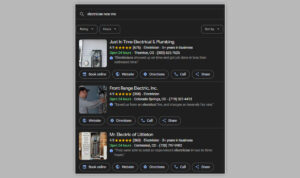Many beginners in affiliate marketing fall into the trap of focusing on sales rather than helping their audience.
But the real key to success is to put your audience first. When you prioritize helping over selling, you build trust, and that trust leads to long-term success.
-
Table of Contents
Key Takeaways
Beginner Affiliate: Building Trust with Your Audience
Understanding the Products You Promote
Importance of Product Knowledge
How to Research Products Effectively
Sharing Personal Experiences
Avoiding the Hard Sell Approach
The Downsides of Being Too Salesy
Creating Helpful Content
Balancing Promotion and Information
Serving Your Audience First
Why a Serve-First Approach Works
Examples of Serving-First Strategies
Long-Term Benefits of Serving First
Choosing the Right Products for Your Audience
Identifying Audience Needs
Matching Products to Those Needs
Avoiding Irrelevant Promotions
Promoting Products You Believe In
The Importance of Authenticity
How to Choose Products You Trust
Building Credibility with Genuine Recommendations
Quality Over Quantity in Affiliate Marketing
Focusing on High-Quality Content
Why Less Can Be More
Creating Value with Fewer Promotions
Ethical Affiliate Marketing Practices
Understanding Ethical Concerns
How to Market Ethically
Building a Positive Reputation
Learning from Common Mistakes
Common Pitfalls to Avoid
Lessons from Failed Campaigns
How to Improve from Mistakes
Long-Term Success in Affiliate Marketing
Sustainable Strategies
Building a Loyal Audience
Measuring Long-Term Success
Conclusion
Frequently Asked Questions
Why is building trust important in affiliate marketing?
How can I earn my audience’s trust?
Why should I know the products I promote?
What is wrong with being too salesy?
How can I promote products without being pushy?
Why should I put my audience first?
How do I choose the right products for my audience?
What are the benefits of promoting products I believe in?

Key Takeaways
-
Building trust with your audience is crucial for long-term success.
-
Knowing the products you promote helps you make genuine recommendations.
-
Avoid being too pushy; focus on creating helpful content instead.
-
Always serve your audience first to build lasting relationships.
-
Choose quality over quantity when promoting products.
Beginner Affiliate: Building Trust with Your Audience
Building trust with your audience is crucial for increasing affiliate sales.
Learn how transparency, quality products, consistency, and engagement can boost your success.
Understanding the Products You Promote
Importance of Product Knowledge
Before you start promoting a product, you need to know it inside and out.
Your reputation is on the line when you recommend something.
If you understand the product well, you can better explain its benefits and drawbacks to your audience.
This helps you become a trusted resource.

How to Research Products Effectively
To research a product effectively, start by using it yourself.
This firsthand experience allows you to answer specific questions and provide genuine feedback.
Additionally, you can read reviews and watch tutorials to gather more insights.
Make sure the product aligns with your audience’s needs.
Sharing Personal Experiences
Sharing your personal experiences with a product can make your recommendations more authentic.
Talk about how the product helped you and why you believe it will benefit your audience.
This builds trust and shows that you’ve put in the work to understand what’s best for them.
Here is an example with the AWeber Review, it’s a tool that I use everyday for my business:

Avoiding the Hard Sell Approach
The Downsides of Being Too Salesy
Promoting products as an affiliate can be tricky. If you come off as too salesy, people might get annoyed or uncomfortable.
They are already bombarded with sales pitches daily.
Instead, focus on building a relationship with your audience. When they trust you, they are more likely to buy what you recommend and even come back for more.
Creating Helpful Content
Instead of pushing products, create content that helps your audience. Share tips, how-tos, and personal experiences.
This way, you provide value and build trust. When you do recommend a product, it feels more like friendly advice than a sales pitch.
Balancing Promotion and Information
It’s important to find a balance between promoting products and providing useful information. You don’t want your audience to feel like you’re just trying to sell them something.
Mix in helpful content with your promotions. This approach makes your recommendations feel more genuine and less like a hard sell.

Serving Your Audience First
Why a Serve-First Approach Works
When you put your audience’s needs first, you build a strong foundation of trust and loyalty.
Your audience will appreciate your genuine efforts to help them, rather than just trying to make a sale.
This approach benefits your audience and enhances your reputation as a reliable source of information.

Examples of Serving-First Strategies
-
Engage with Your Audience: Respond to comments, emails, and social media messages. Show that you care about their questions and concerns.
-
Provide Valuable Content: Create blog posts, videos, and guides that address your audience’s problems and offer solutions.
-
Offer Free Resources: Share free tools, templates, or eBooks that can help your audience achieve their goals.
-
Exclusive access to Masterclasses: Invite your audience to join free webinars or training sessions that provide valuable insights and tips.
By the way, you can secure your spot for the free training an learn how to launch your own affiliate business in 7 days flat.
Long-Term Benefits of Serving First
If you really focus on serving your audience, you create a loyal community that trusts your recommendations.
This trust leads to higher engagement, more referrals, and ultimately, better sales. In the long run, a serve-first approach is more sustainable and rewarding than prioritizing quick sales.

Choosing the Right Products for Your Audience
Identifying Audience Needs
The most important thing to consider when selecting a product to market is, “is it relevant to your audience?”
For instance, promoting dumbbells on a blog about travel might not be the smartest thing, because most of your audience could care less about them.
Promoting a travel insurance plan makes much more sense, since almost every one of your readers might need it.
Matching Products to Those Needs
Once you’ve gotten to know your audience and its needs and pain points, how do you select a specific product?
Think about a brand new visitor who comes to your site for the first time—what is it you want that person to ultimately achieve?
This might be a tough question to answer, but you need to know what you want your visitors to do, because if you don’t, then everything you recommend is going to seem random.

Avoiding Irrelevant Promotions
You need your recommendations to be precise and targeted, so your audience can get what they need from you to reach their goals.
Once you’ve identified what you want to help your new visitor to achieve, think about how they’re going to get there.
Defining the steps on this path will help you determine exactly what kinds of products will help your audience at different points along the path.
Promoting Products You Believe In
The Importance of Authenticity
When you promote products, your reputation is on the line. Anything you promote directly reflects on you and your brand.
If you recommend something you haven’t tried, people will notice.
I can guaranty you that.
They won’t trust your recommendations if they think you’re not genuine.
I often jumped on video calls with potential customers interested in the main high ticket product I promote.
I answered all their questions and built trust at the same time.

How to Choose Products You Trust
To become a helpful resource, you need to use and experience the products yourself.
This way, you can answer specific questions and help your audience make informed decisions.
Your knowledge can help them find the right solutions.
Building Credibility with Genuine Recommendations
If you really believe in the product, your audience will too. If your motives are just for the commission, people will see through it.
It’s all about energy.
People can feel this
Believe in your recommendation, and your audience will believe in you.
Quality Over Quantity in Affiliate Marketing
Focusing on High-Quality Content
Instead of bombarding your audience with numerous affiliate links, prioritize quality content that genuinely addresses their needs and concerns.
Build authentic relationships with your audience, and recommend products or services that you genuinely believe in.
Why Less Can Be More
Producing too much low-quality content can harm your reputation. In this case, it’s better to create fewer, but more valuable, pieces of content.
This way, you can maintain your audience’s trust and keep them engaged.
If you can do both quality and quantity, you’ll be unstoppable!

Creating Value with Fewer Promotions
When you focus on fewer promotions, you can spend more time ensuring each one is helpful and relevant.
This approach not only helps your audience but also builds your credibility as a trustworthy source.
By focusing on quality over quantity, you can create a more sustainable and successful affiliate marketing strategy.
Ethical Affiliate Marketing Practices
Understanding Ethical Concerns
Affiliate marketing isn’t a quick, impersonal thing. It’s the exact opposite. You need to start from an authentic place.
Affiliate marketing is about fostering genuine long-term relationships with people you trust, products you love, and companies that align with you and your philosophies.
And unless you truly know the product, have used it successfully for yourself, and can prove that to your audience, you can’t expect others to just take your word for it.
Make sure you understand this! By being transparent about your experiences and providing honest reviews, you can establish a strong foundation of trust.

How to Market Ethically
When done the right way, affiliate marketing can be a win–win–win. But at the center of this is one thing: your audience’s trust.
When your audience believes you have their best interests at heart and trusts your recommendations, then all three parties in the affiliate marketing relationship ultimately benefit.
A lot of people worry about getting involved with affiliate marketing because it might make them look slimy or too salesy.
Building a Positive Reputation
I’ve made it part of my mission to show that affiliate marketing can be done in a legit way, one where everybody can be a winner.
But at the same time, because affiliate marketing is technically easy to do, it’s easy to fall into an aggressive, income-first approach rather than one centered around serving your audience.
I want you to be aware of how affiliate marketing can be abused, or how your efforts can be derailed.
Learning from Common Mistakes
Common Pitfalls to Avoid
In affiliate marketing, there are several common mistakes that beginners often make. Avoiding these pitfalls can save you time and money.
Here are some of the most frequent errors:
-
Promoting too many products at once (I felt into that one when I started) and quickly learned that focusing on a few quality products is much better).
-
Not understanding the products you’re promoting
-
Ignoring your audience’s needs
-
Focusing solely on sales rather than providing value

Lessons from Failed Campaigns
Every failed campaign is a learning opportunity.
When a campaign doesn’t work out, take the time to figure out why.
Was it the product?
The way you promoted it?
Or maybe your audience wasn’t interested? Understanding these factors can help you improve your future campaigns.
How to Improve from Mistakes
Continuous improvement is key in affiliate marketing. Test different strategies, like choosing between a webinar funnel and a VSL.
Focus on quality content and engagement. Learn from your mistakes and keep refining your approach. This way, you’ll be better prepared for future success.
Long-Term Success in Affiliate Marketing
Sustainable Strategies
To achieve long-term success as a beginner affiliate, you need to focus on sustainable strategies.
This means choosing methods that will work not just today, but also in the future.
Consistency and dedication are key. Always be learning and adapting to new trends in the market.
Building a Loyal Audience
A loyal audience is your most valuable asset. Engage with your audience regularly and provide them with valuable content.
Respond to their questions and feedback. This will help you build trust and keep them coming back.
Measuring Long-Term Success
It’s important to measure your success over time. Use tools to track your progress and see what’s working and what’s not.
This will help you make informed decisions and improve your strategies. Continuous learning and improvement are essential for long-term success.
Achieving long-term success in affiliate marketing doesn’t have to be a mystery.
With the right guidance and tools, you can launch your own affiliate business in just 7 days.
Ready to take the next step?
Check out our free training to discover the secret model top marketers use and start your journey today!
Conclusion
In the end, the heart of affiliate marketing is about helping others. When you focus on serving your audience first, you build trust and long-lasting relationships. This trust is what leads to sustainable success.
Remember, it’s not just about making a quick buck. Know the products you promote, be genuine, and avoid being too pushy.
By putting your audience’s needs first, you’ll find that the rewards will naturally follow.
So dear affiliate, keep helping, stay honest, and watch your affiliate marketing efforts thrive.
Thanks for reading,
Laurence
Frequently Asked Questions
Why is building trust important in affiliate marketing?
Building trust is key because people are more likely to buy from someone they trust. Without trust, your audience won’t believe in your recommendations.
How can I earn my audience’s trust?
You can earn trust by being honest, sharing useful information, and only promoting products you truly believe in. Always put your audience’s needs first.
Why should I know the products I promote?
Knowing the products helps you give better advice and recommendations. When you understand a product well, you can explain its benefits and drawbacks clearly.
What is wrong with being too salesy?
Being too salesy can turn people off. They get bombarded with sales pitches all the time and don’t want to feel pressured. It’s better to be helpful and informative.
How can I promote products without being pushy?
Create content that helps and informs your audience. Share your experiences and give honest reviews. Balance promotion with useful information.
Why should I put my audience first?
Putting your audience first builds trust and loyalty. When you help them solve problems, they are more likely to appreciate your recommendations and buy through your links.
How do I choose the right products for my audience?
Identify your audience’s needs and find products that match those needs. Avoid promoting irrelevant products just to make money.
What are the benefits of promoting products I believe in?
When you promote products you believe in, you build credibility and trust. Your audience can tell when you’re genuine, leading to long-term success.
Source: fractalmax.agency



